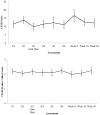Positive Psychotherapy for Smoking Cessation: Treatment Development, Feasibility and Preliminary Results
- PMID: 24683417
- PMCID: PMC3964803
- DOI: 10.1080/17439760.2013.826716
Positive Psychotherapy for Smoking Cessation: Treatment Development, Feasibility and Preliminary Results
Abstract
Low positive and high negative affect predict low rates of smoking abstinence among smokers making a quit attempt. Positive Psychotherapy can both increase positive affect and decrease negative affect and therefore may be a useful adjunct to behavioral smoking counseling. The purpose of the present study was to assess the feasibility and acceptability of a Positive Psychotherapy for Smoking Cessation (PPT-S) intervention that integrates standard smoking cessation counseling with nicotine patch and a package of positive psychology interventions. We delivered PPT-S to 19 smokers who were low in positive affect at baseline. Rates of session attendance and satisfaction with treatment were high, and most participants reported using and benefiting from the positive psychology interventions. Almost one-third of participants (31.6%) sustained smoking abstinence for 6 months after their quit date. Future studies to assess the relative efficacy of PPT-S compared to standard smoking cessation treatment are warranted.
Keywords: behavioral treatment; depressive symptoms; positive affect; positive psychotherapy; smoking; smoking cessation.
Figures


References
-
- Berlin I, Covey LS. Pre-cessation depressive mood predicts failure to quit smoking: The role of coping and personality traits. Addiction. 2006;101:1814–1821. doi: http://dx.doi.org/10.1111/j.1360-0443.2006.01616.x. - DOI - PubMed
-
- Bränström R, Penilla C, Pérez-Stable EJ, Muñoz RF. Positive affect and mood management in successful smoking cessation. American Journal of Health Behavior. 2010;34:553–562. Retrieved from http://search.proquest.com/docview/815570913?accountid=14168. - PubMed
-
- Brown RA, Kahler CW, Niaura R, Abrams DB, Sales SD, Ramsey SE, Miller IW. Cognitive–behavioral treatment for depression in smoking cessation. Journal of Consulting and Clinical Psychology. 2001;69:471–480. doi: http://dx.doi.org/10.1037/0022-006X.69.3.471. - DOI - PMC - PubMed
-
- Brown RA, Niaura R, Lloyd-Richardson E, Strong DR, Kahler CW, Abrantes AM, Miller IW. Bupropion and cognitive-behavioral treatment for depression in smoking cessation. Nicotine & Tobacco Research. 2007;9:721–730. doi: http://dx.doi.org/10.1080/14622200701416955. - DOI - PMC - PubMed
-
- Burgess ES, Brown RA, Kahler CW, Niaura R, Abrams DB, Goldstein MG, Miller IW. Patterns of change in depressive symptoms during smoking cessation: Who's at risk for relapse? Journal of Consulting and Clinical Psychology. 2002;70:356–361. doi: http://dx.doi.org/10.1037/0022-006X.70.2.356. - DOI - PMC - PubMed
Grants and funding
LinkOut - more resources
Full Text Sources
Other Literature Sources
